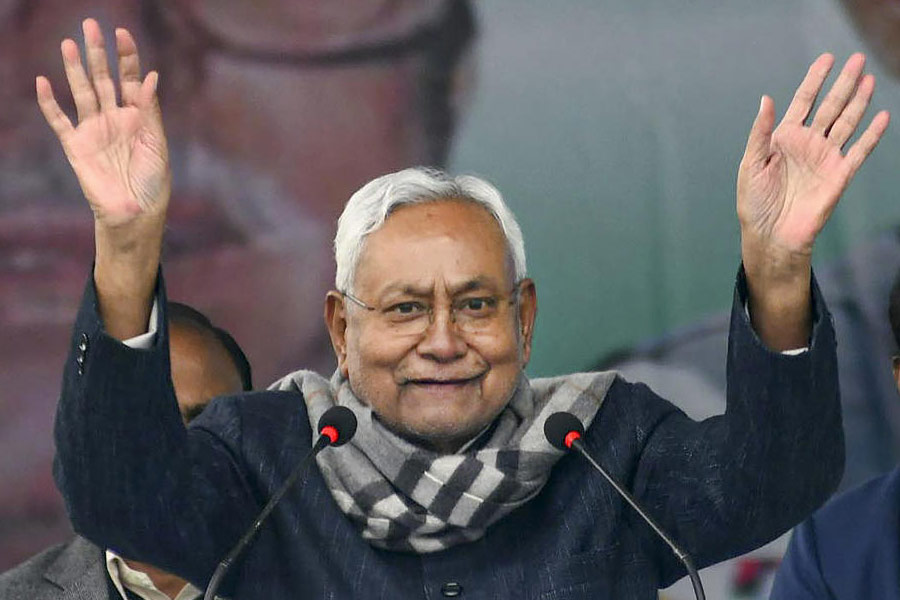Nitish Kumar, who changed partners on Sunday and retained the chief minister’s chair, will have to deal with a far more aggressive BJP this time with the Narendra Modi-Amit Shah duopoly determined to “conquer” Bihar, sources said.
While the immediate project of hurting the Opposition bloc INDIA may have driven Modi-Shah to rush into a partnership with Nitish, their eyes are set firmly on the long-term target of taking full control of the key heartland state, BJP insiders suggested.
“The top leadership went in for a realignment with Nitish despite strong objections from the Bihar party. It is a stoop-to-conquer strategy,” a BJP leader said. “This time Bihar will be run by the BJP and not Nitish.”
However, Modi and Shah will not disturb Nitish ahead of the Lok Sabha polls, focusing instead on their target of maximising their Lok Sabha tally from Bihar.
As part of a deal, the BJP will contest a higher number of seats than the Janata Dal United, the sources said. The two parties had contested 17 seats each in 2019, leaving the remaining 6 seats in Bihar to the Lok Janshakti Party.
“This time we want to contest around 20 and leave only 14-15 seats for the JDU,” a BJP leader said.
After the general election, the BJP is likely to start consolidating its base in Bihar with the objective of knocking Nitish off his perch, party strategists said.
With the 72-year-old Nitish in the last leg of his political career, and lacking a worthy heir to carry his legacy forward, BJP strategists feel the job can be done without much resistance.
The JDU already stands badly diminished, commanding just 44 MLAs in the 243-member Assembly, down from its high of 115 in 2010. The BJP has 78 MLAs.
If the NDA wins the Bihar Assembly polls next year with the BJP bagging more seats than the JDU, the saffron party is likely to stake claim to the chief minister’s chair, party sources said.
“Nitish can be given an honourable exit with a post-retirement job at the Centre after 2025,” a BJP leader said.
The BJP strategy to clip Nitish’s wings is reflected in its choice of the party’s two deputy chief ministers, particularly that of Samrat Choudhary.
Choudhary, the state BJP president who belongs to the OBC Kushwaha/ Koiri caste, is a vehement critic of Nitish.
Nitish draws his core strength from the “Luv-Kush” caste combination, a term used for the Kurmi-Kushwaha caste bloc. By installing Choudhary as deputy chief minister, the BJP has telegraphed its intention of eating into Nitish’s support base.
Choudhary took oath on Sunday wearing the safa, a headgear that he had previously vowed to discard only after dethroning Nitish.
Sources said Nitish had indicated to the BJP that he preferred senior leader Sushil Kumar Modi as his deputy, but the ally has ignored the request.
Sushil Modi, an OBC, had served as Nitish’s trusted deputy in the past. Most Bihar BJP leaders allege that his proximity to Nitish led him to compromise the party’s interests.
Along with Choudhary, the BJP has picked the upper caste Vijay Sinha as deputy chief minister. Both are aggressive new-generation politicians.
Further, the Modi government move that appeared to give Nitish one more pretext to embrace the NDA — the award of the Bharat Ratna to socialist icon Karpoori Thakur — is being seen as a BJP attempt to nibble away at the JDU’s non-Yadav OBC base. The BJP has so far in Bihar drawn its strength mainly from the upper castes.
“Nitish Kumar has been the irritating third pole in Bihar for a long time now. We want the state to become bipolar: BJP vs RJD,” a BJP parliamentarian from Bihar said, indicating a BJP ambition to gobble up the JDU’s leaders and voters.
“This should not be a difficult job since Nitish’s voters are naturally anti-RJD,” the MP said.










